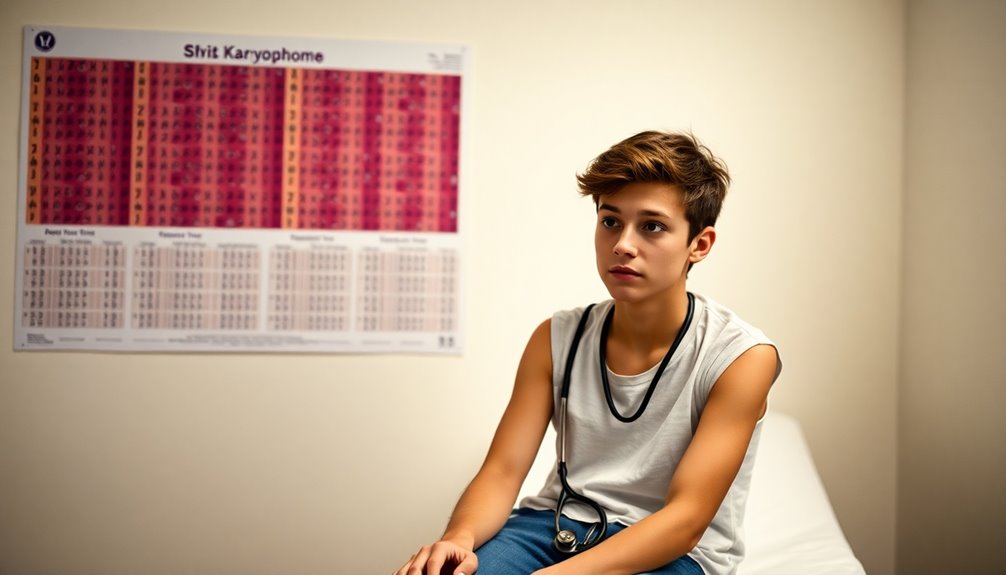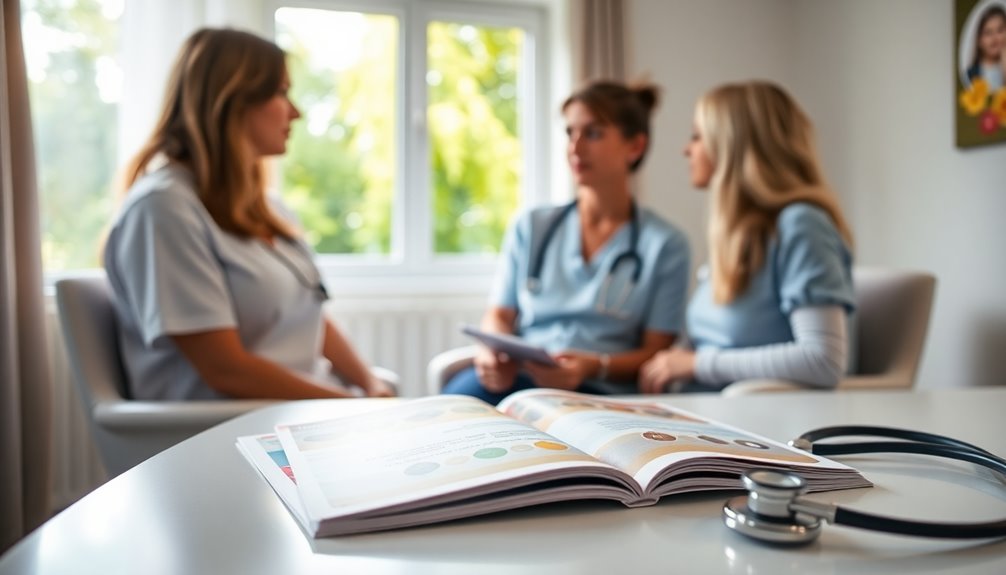Klinefelter syndrome is the most common sex chromosome abnormality, affecting about 1 in 500 to 1,000 males. It occurs when a male has an extra X chromosome, resulting in a 47,XXY configuration. You might notice symptoms like reduced testosterone levels, taller stature, and fertility issues. Many individuals may face psychological challenges like anxiety and low self-esteem. Diagnosis typically involves karyotyping, while hormone therapy can help manage some symptoms. It's crucial to monitor associated health risks. If you'd like to explore more about the causes, symptoms, and management options, there's plenty more to uncover.
Key Takeaways
- Klinefelter Syndrome (47,XXY) is the most common sex chromosome abnormality, affecting approximately 1 in 500 to 1,000 males.
- It results from nondisjunction during meiosis, leading to an extra X chromosome.
- Symptoms include testosterone deficiency, infertility, and gynecomastia, along with taller stature.
- About 10-20% of cases are mosaic, presenting milder symptoms and varying effects.
- Early diagnosis through karyotyping and awareness can improve management and treatment outcomes.
Overview of Klinefelter Syndrome

Klinefelter syndrome, which arises from the presence of an extra X chromosome, typically manifests as a 47,XXY karyotype and affects about 1 in 500 to 1,000 males.
This genetic condition often leads to symptoms like testosterone deficiency, reduced fertility, and gynecomastia. You might notice that individuals with Klinefelter syndrome tend to be taller due to delayed bone maturation, and many experience mild symptoms or learning difficulties during childhood, leaving it undiagnosed until adulthood.
Complications can include higher risks of anxiety, depression, osteoporosis, and certain cancers, including breast cancer.
Diagnosis typically involves karyotyping, while treatment options, such as hormone therapy, aim to address testosterone deficiency and provide psychological support for emotional well-being.
Genetic Causes and Mechanisms

When you consider the genetic causes of Klinefelter syndrome, it's clear that nondisjunction during meiosis plays a critical role. This process leads to the formation of an extra X chromosome, resulting in the 47,XXY configuration typically associated with Klinefelter syndrome.
In most cases, random genetic changes during sperm or egg formation cause this chromosomal anomaly, affecting all cells in the individual. However, about 10-20% of cases are classified as mosaic Klinefelter syndrome. In these instances, some cells have the extra X chromosome while others do not, often leading to a milder phenotype.
Advanced maternal age is a significant risk factor, increasing the likelihood of these nondisjunction events during gamete formation, and thus contributing to the incidence of Klinefelter syndrome.
Symptoms and Clinical Features

Individuals with Klinefelter syndrome often face a range of symptoms and clinical features that can significantly impact their quality of life. This sex chromosome abnormality, characterized by a karyotype of 47,XXY, can lead to reduced testosterone levels, resulting in symptoms like gynecomastia, decreased muscle mass, and infertility.
You might notice taller stature due to delayed bone maturation, alongside developmental delays in motor skills and language. Psychological symptoms are also common, with increased risks of anxiety, depression, and low self-esteem affecting many individuals.
Additionally, complications such as osteoporosis, cardiovascular diseases, and an elevated breast cancer risk may arise if hormone therapy isn't administered. Understanding these symptoms is crucial for managing Klinefelter syndrome effectively.
Diagnosis and Screening Methods

To effectively diagnose sex chromosome abnormalities like Klinefelter syndrome, healthcare providers rely on karyotyping, a method that evaluates the number and structure of chromosomes. This analysis confirms the presence of an extra or missing sex chromosome, which is crucial for identifying conditions such as Turner syndrome.
Prenatal testing, including non-invasive prenatal testing (NIPT) and chorionic villus sampling (CVS), allows for early detection of these chromosome abnormalities during pregnancy, especially in women over 35 who face increased risks.
Genetic counseling is also recommended for families with a history of these conditions, helping them understand the risks and implications.
Many individuals may remain undiagnosed until puberty or adulthood, underscoring the importance of awareness and targeted screening.
Treatment and Management Options

Effective management of sex chromosome abnormalities, particularly Klinefelter syndrome, often involves a combination of treatments tailored to address both physical and emotional needs.
Testosterone replacement therapy is a key treatment that can significantly enhance your physical strength, mood, and sexual function, especially if started during adolescence or early adulthood.
If you're concerned about fertility, assisted reproductive technologies can provide options for those wishing to conceive, despite low sperm production.
It's also crucial to monitor and manage health risks like osteoporosis and cardiovascular issues.
Additionally, psychological support and counseling can help you cope with emotional challenges, such as anxiety and low self-esteem.
A multidisciplinary care approach ensures comprehensive management, involving specialists like endocrinologists and mental health professionals.
Long-Term Outlook and Support

Managing Klinefelter syndrome goes beyond treatment; it's about understanding the long-term outlook and the support available to you. With early diagnosis and intervention, including hormone therapy and educational support, you can significantly improve your long-term outcomes.
However, you may still face challenges like learning disabilities and fertility issues, making ongoing health monitoring crucial. Regular check-ups can help address the increased risks for conditions such as osteoporosis and cardiovascular diseases.
Don't overlook the importance of psychological support; counseling can aid in building self-esteem and coping strategies for emotional challenges. Connecting with support groups and organizations focused on genetic conditions can also provide valuable resources and community, ensuring you're not alone on this journey.
Frequently Asked Questions
What Is the Most Common Type of Sex Chromosome Variation?
When considering sex chromosome variations, you encounter a range of conditions that affect individuals differently.
Some variations involve an extra chromosome, while others might involve a missing one.
You'll find that conditions like Klinefelter syndrome and Turner syndrome are among the more recognized ones.
These variations can lead to various symptoms and challenges, so understanding their implications is crucial for anyone affected or interested in genetic health.
What Is the Most Common Chromosomal Abnormality?
When you think about chromosomal abnormalities, you'll find that aneuploidy is quite common. This occurs when there's an abnormal number of chromosomes, like Down syndrome, which results from an extra chromosome 21.
It's estimated that this affects about 1 in 700 births. Other abnormalities also exist, but Down syndrome stands out due to its prevalence and recognizable traits.
If you're curious, researching further can reveal more about these genetic variations.
Which of the Following Are the Most Common Sex-Linked Chromosomal Abnormalities?
When you look at sex-linked chromosomal abnormalities, you'll find several notable conditions.
Turner syndrome affects females with a single X chromosome. Klinefelter syndrome involves males with an extra X chromosome, and XYY syndrome includes males with an extra Y chromosome.
Triple X syndrome occurs in females who've an additional X chromosome. Each of these conditions has unique characteristics and can lead to a variety of clinical features and challenges.
Is XXY or Xyy More Common?
When you compare XXY and XYY, XXY is more common.
Klinefelter syndrome, which is associated with the XXY configuration, affects about 1 in 500 to 1 in 1,000 male births.
In contrast, XYY syndrome occurs in approximately 1 in 850 to 1 in 3,000 male births.
Most people with Klinefelter syndrome remain undiagnosed until adulthood, while XYY syndrome is often identified earlier through genetic testing.
Thus, you'll find Klinefelter to be more prevalent.
Conclusion
In conclusion, Klinefelter Syndrome is the most common sex chromosome abnormality, and understanding it can help you support those affected. Recognizing the genetic causes and symptoms is crucial for early diagnosis and effective management. With appropriate treatment, individuals can lead fulfilling lives. Stay informed about the long-term outlook and resources available, so you can provide the necessary support to those facing this condition. Knowledge is key to improving their quality of life and overall well-being.










